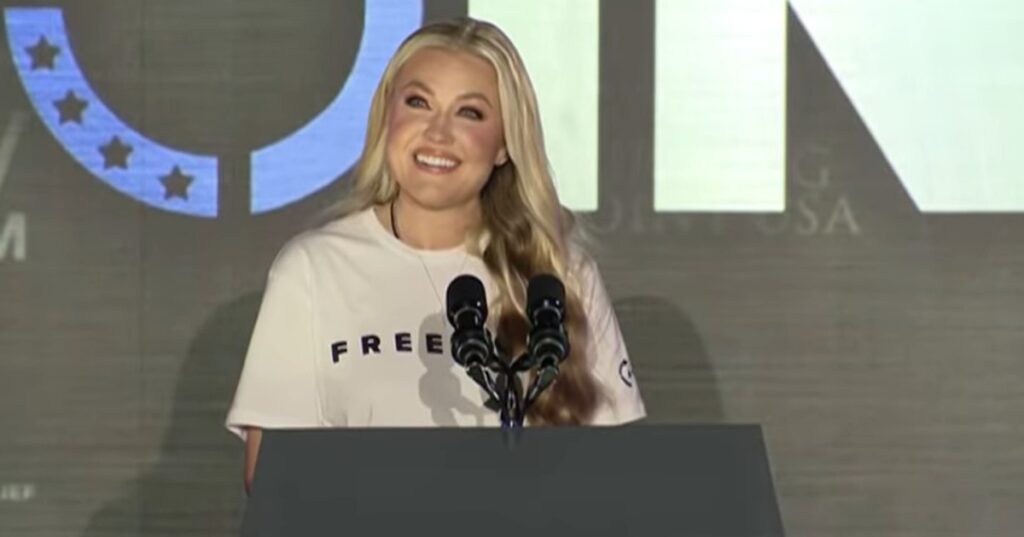Erika Kirk told Fox News host Jesse Watters she refuses to watch the video of Charlie Kirk’s assassination and described how she has coped in public while taking on leadership roles and accepting honors on his behalf.
Erika Kirk made a clear, personal stand about the footage from the day her husband was killed, telling Watters exactly where she draws the line. “I never saw the video. I never will see it. I never want to see it,” she said, refusing to let that image become part of her private life. She explained why that boundary matters with a short, sharp observation about how certain images stay with you forever. “Certain things you see in your life that you can never unsee. There’s certain things you see in your life that mark your soul forever,” she added.
She repeated that her husband’s public killing is not something she will subject herself to, saying plainly, “I don’t want my husband’s public assassination to be something l ever see,” and making the emotional stakes crystal clear. That stance is also a moral rejection of turning a private human tragedy into viral spectacle. Her choice is both personal and political in the current media landscape where violent clips can spread instantly. It sets a tone for how families of the victims navigate grief in a tabloid age.
Kirk didn’t hold back about how she views people who get a thrill from those violent clips. She called the appetite for that content morally wrong and bluntly described it as disturbing. “For people who actually enjoy watching that, it is quite literally sick,” Kirk concluded, a line that reads like a judgment of a culture that profits from pain. Her words landed hard because they addressed not just the footage but the audience for it.
The shooting happened in Utah on September 10 while Charlie Kirk was speaking to college students at a Turning Point USA event, a moment that shook conservative circles and the broader public. The shooter has been described as allegedly a 22-year-old male who lived with his transgender partner, details that have been reported as part of the case narrative. The killing turned a political activist and organizer into a martyr-like figure for a movement that prizes open debate and free speech. It also forced a reckoning over security at public events and how to respond to politically motivated violence.
Since that day Erika has been in the spotlight for reasons beyond private mourning. She announced plans to run Turning Point in her late husband’s place and accepted the Medal of Freedom from President Donald Trump on his behalf last month, steps that signal continuity in leadership and a refusal to let the movement falter. At her husband’s memorial she spoke in a tone that surprised some and steadied others by saying she forgives the shooter. President Trump spoke at the same service, offering a lengthy tribute that included, “We know the weight of this monumental loss is almost unbearable, but even in the midst of heartache and pain too great to even fathom, you have somehow found the strength and deep faith to be a comfort to millions and millions of people.”
The public response has been massive and deeply emotional, with more than 60,000 people gathering at State Farm Stadium in Arizona to mourn alongside the family. That turnout reflected how many people connected to the message Charlie carried and how they wanted to show solidarity with Erika and the movement he helped build. Millions more around the country and the world shared in the sorrow, and the size of the gatherings underscored the national resonance of the loss. Those crowds were a visible expression of collective grief and political solidarity.
From a Republican perspective, Erika’s conduct since the assassination has been framed as strength under pressure and moral clarity in the face of violence. Her refusal to consume the assassination footage, her forgiveness offered publicly, and her willingness to assume leadership responsibilities all read as examples of resilience that conservatives can point to in public debates. Her actions also steer attention back to key issues for the movement: defending free speech, protecting open debate on campuses, and ensuring safe spaces for political discourse. That framing is deliberate and meant to keep the focus on policy and principle rather than sensational details.
The episode raises questions about media responsibility and platform moderation, because the quick spread of violent content fuels secondary harm to victims’ families and their communities. It also puts pressure on organizers and venues to reassess security practices at political events to prevent similar tragedies. How social platforms respond to clips of real-world violence will remain a contested issue, especially when politicians and public figures are targets. In the months ahead Erika’s choices and the broader reaction to this attack will shape both the movement she now helps lead and the national conversation about dignity, media consumption, and the limits of public spectacle.



